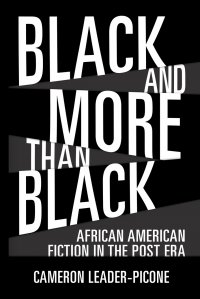Post-Blackness. Post-Soul. Post-Black Art. New Blackness. How has the meaning of blackness changed in the twenty-first century? Cameron Leader-Picone suggests that this proliferation of terms, along with the renewed focus on questioning the relationship between individual black artists and the larger black community, indicates the arrival of novel forms of black identity and black art.Leader-Picone defines these terms as significant facets of a larger post era, linking them with the social and political context of Barack Obama's presidency. Analyzing claims of progress associated with Obama's election and post-era thinking, He examines the contours of black aesthetics in the new century.To do so, he sifts through post-era African American fiction, considering both celebrations and rejections of an early twenty-first-century rhetoric of progress. As well, he maps the subsequent implications of these concepts for rearticulating racial identities. Through the works of Colson Whitehead, Alice Randall, Chimamanda Ngozi Adichie, Paul Beatty, Kiese Laymon, and Jesmyn Ward, Leader-Picone tracks how recent fiction manifests the tension between the embrace of post-civil rights era gains and the recognition of persistent structural racism.Ultimately far less triumphal than the prefix post would imply, these authors address the Black Arts Movement and revise double consciousness and other key themes from the African American literary tradition. They interrogate their relevance in an era encompassing not only the election of the nation's first black president, but also the government's failed response to Hurricane Katrina, expanding class divisions within the black community, mass incarceration, and ongoing police violence. Это и многое другое вы найдете в книге Black and More Than Black. African American Fiction in the Post Era (Cameron Leader-Picone)
Black and More Than Black. African American Fiction in the Post Era Cameron Leader-Picone
Подробная информация о книге «Black and More Than Black. African American Fiction in the Post Era Cameron Leader-Picone». Сайт не предоставляет возможности читать онлайн или скачать бесплатно книгу «Black and More Than Black. African American Fiction in the Post Era Cameron Leader-Picone»
